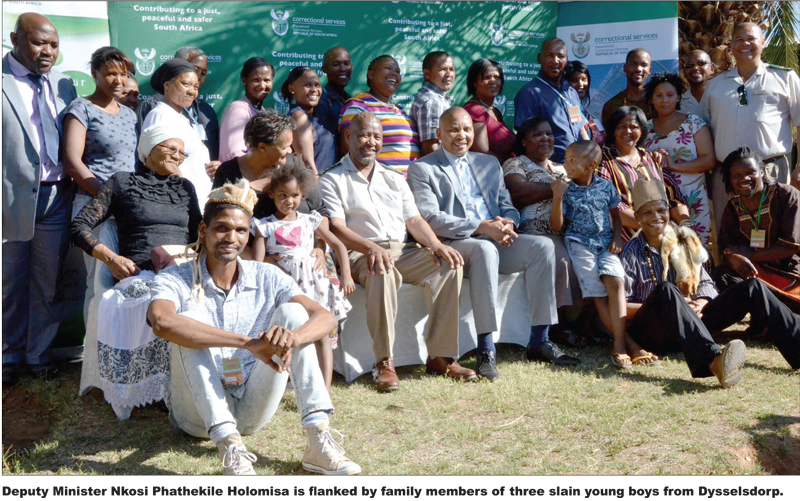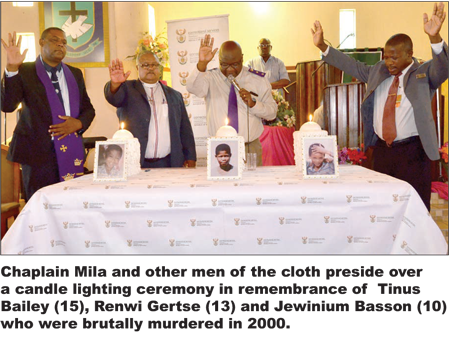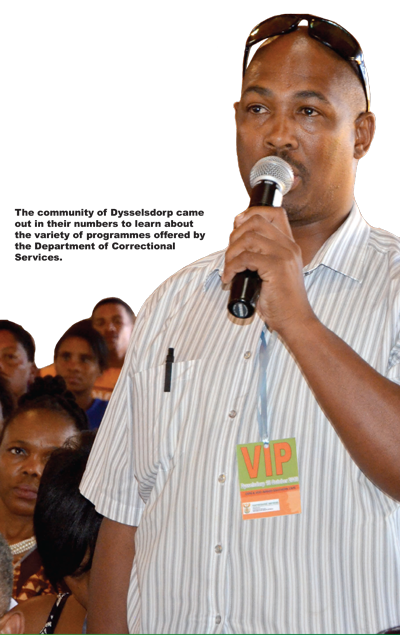
As a way of bringing government services closer to the people, Deputy Minister Nkosi Phathekile Holomisa embarked on a two-day multi-pronged visit to Dysselsdorp, in the Western Cape, on 15 October 2019. Inspired by the spirit of ‘Ubuntu’ and ‘Thuma mina’, Nkosi Holomisa used both gatherings to enjoin the locals to be the chief architects in building safe, peaceful and crime-free neighbourhoods of their dreams.
The aptly dubbed: “Parole Board and Victim-Offender Dialogue Imbizos”, organised by the branch Community Corrections in conjunction with the Western Cape Region, provided Deputy Minister Nkosi Holomisa with an opportunity to interact with community members, and to promote an array of programmes offered by the Department of Correctional Services (DCS).
His multi-legged visit also encompassed the unveiling of a tombstone for three local boys who were murdered on 10 January 2000. The Deputy Minister conveyed his commiserations to the families of Tinus Bailey (15), Renwi Gertse (13) and Jewinium Basson (10) whose young lives were brutally and abruptly cut short almost two decades ago. “Our nation can never repay the debts we owe to the families of the three young people whose lives were lost so prematurely. That is why we must continue to do everything we can – with all that we have – to contribute to a just, peaceful and safer South Africa,” said Nkosi Holomisa.
 Mr Donovan Le Roux from DCS explained the Victim-Offender Dialogue (VOD) programme to keen community members. He said the programme seeks to give a safe platform to victims and perpetrators of crime to talk about the impact of the latter’s criminal actions. The VOD also creates a conducive setting for the perpetrator to ask for forgiveness. Le Roux dissuaded youngsters from engaging in crime. He beseeched the perpetrators of crime to consider the ripple effect of their deeds, and the consequent disruption, dysfunction and trauma it causes to the victims and their families. Mr Leonard Davids educated community members about the mandate of the Parole Board in order to improve their understanding of parole processes.
Mr Donovan Le Roux from DCS explained the Victim-Offender Dialogue (VOD) programme to keen community members. He said the programme seeks to give a safe platform to victims and perpetrators of crime to talk about the impact of the latter’s criminal actions. The VOD also creates a conducive setting for the perpetrator to ask for forgiveness. Le Roux dissuaded youngsters from engaging in crime. He beseeched the perpetrators of crime to consider the ripple effect of their deeds, and the consequent disruption, dysfunction and trauma it causes to the victims and their families. Mr Leonard Davids educated community members about the mandate of the Parole Board in order to improve their understanding of parole processes.
Community members from Dysselsdorp and neighbouring areas raised a glut of pertinent issues, including:
- Criminal records as an impediment to securing employment for former inmates
- Discontent about Government support for small business enterprises
- Drugs, alcohol and unemployment as a major contributor of crime
The Deputy Minister called for DCS to forge working partnerships with sister departments, non-governmental organisations, faith-based formations and community organisations in a joint effort to rehabilitate those in conflict with the law. “Rehabilitation is a collective responsibility and we can all restore peace between the transgressor and the aggrieved, and in so doing, build a safer South Africa,” he concluded.
